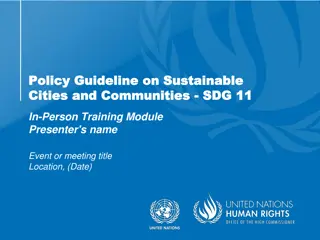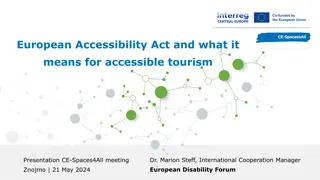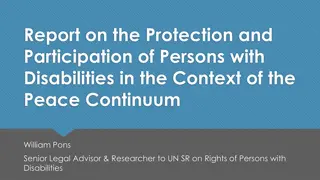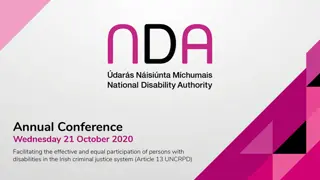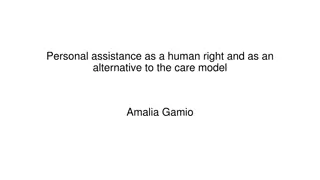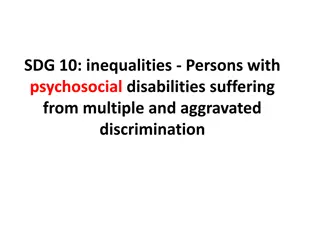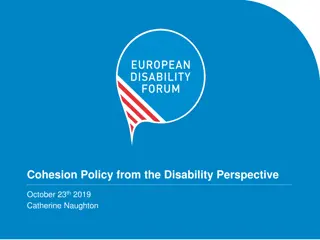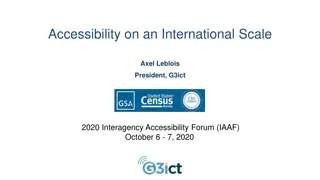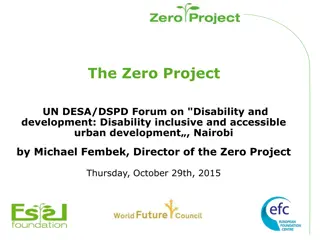Sustainable Policy Guidelines for Inclusive Cities Training Module
This training module focuses on familiarizing participants with the SDG-CRPD resource package to ensure accessible cities and communities for people with disabilities. It covers understanding the current disability situation, identifying policy steps, and accessing relevant information for implement
0 views • 35 slides
Understanding the European Accessibility Act for Enhanced Accessible Tourism
The European Accessibility Act aims to establish minimum accessibility requirements across various products and services, including tourism, to empower individuals with disabilities. This act builds upon the UN CRPD Article 9, emphasizing equal access and participation. The directive, adopted in 201
0 views • 11 slides
Enhancing Protection and Participation of Persons with Disabilities in Peacebuilding
This report by William Pons emphasizes the active involvement of persons with disabilities in humanitarian actions, conflict resolution, and peacebuilding processes. It calls for the recognition and application of the CRPD across the entire peace continuum, avoiding fragmentation of international la
0 views • 8 slides
Supporting Children with Disabilities in Child Detention: International Rights Standards
Professor Ursula Kilkelly highlights the importance of adhering to international standards such as the CRPD and CRC when supporting children with disabilities in child detention. The research emphasizes the need for age-appropriate accommodations, individual assessments, and child-friendly justice p
0 views • 11 slides
Identifying Populations with Disabilities Using Washington Group Questions
Explore how the Washington Group Short Set questions can be utilized to identify different populations with disabilities, understand the impact of different disability definitions on data findings, and learn about the recommended question set for disability data disaggregation in monitoring CRPD and
0 views • 18 slides
Fulfilling the Right to Personal Assistance for Persons with Disabilities under CRPD
Personal assistance is a crucial aspect of promoting human rights for individuals with disabilities, as outlined in the CRPD. It plays a key role in enabling autonomy, independence, and inclusion in society. The CRPD emphasizes the importance of providing access to various forms of support, includin
0 views • 12 slides
Addressing Inequalities Faced by Persons with Psychosocial Disabilities
Persons with psychosocial/mental disabilities globally experience discrimination, impacting their rights and opportunities. Violations include coercion, denial of legal capacity, limited access to education and employment, and more. International human rights standards, such as the CRPD, emphasize n
0 views • 7 slides
Cohesion Policy from the Disability Perspective: Implementing CRPD in EU Budget
The article discusses the EU's commitment to the Convention on the Rights of Persons with Disabilities, focusing on using the budget to align with the CRPD. Emphasizing the need for EU funding to support disability rights, it highlights the European Disability Movement's approach to the Multiannual
0 views • 28 slides
Advancing Global Accessibility Through G3ict Initiatives
G3ict, a nonprofit organization formed in 2006, collaborates with global entities to promote accessibility for persons with disabilities in the ICT sector. Through initiatives like the DARE Index and the Country Data Dashboard, G3ict evaluates and tracks the accessibility progress of countries world
0 views • 12 slides
Zero Project: Creating Inclusive Urban Development for Persons with Disabilities
The Zero Project, initiated by the Essl Foundation, focuses on promoting a world without barriers by supporting the UN CRPD implementation. With a network of experts, they research best practices and policies to enhance the lives of persons with disabilities. The project's success lies in its divers
0 views • 10 slides
